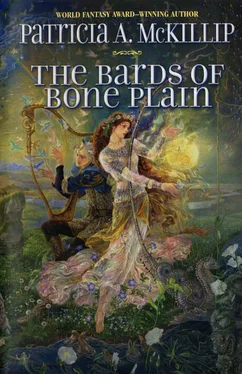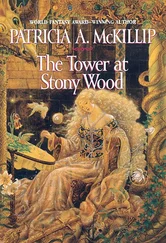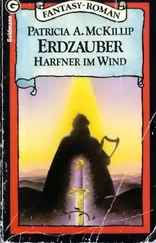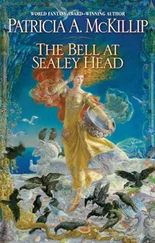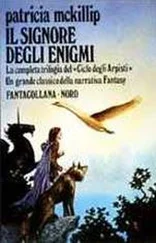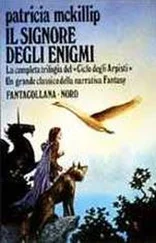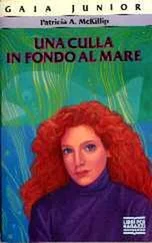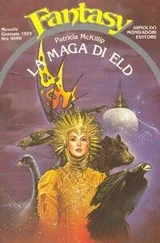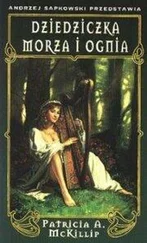The ballad ended. The men sat silently, staring at the harper.
“Sad,” one breathed finally, of the princess who had fled her life on her own bare feet to meet her true love in secret, only to find him dead in their trysting bower with her husband’s wedding ring lying in the hollow of his throat.
Another spoke, after another silence. “Reminds me of a ballad my wife sings. Only it’s a sea-maid, not a princess, and her husband is seaborn as well, but her own true love is a mortal man, drowned by a wave and found in the sand with a black pearl on his throat.”
Nairn saw a familiar kindling in Declan’s eye. “Please,” the bard said. “Sing it for me.”
“Ah, no,” the man protested, trying to shift to safety behind his friends. “I couldn’t. Not for you.”
“I’ll sing with you,” Nairn suggested promptly. “I know it.”
You see? their faces told Declan as Nairn began. He knows everything.
They were all singing it toward the end, all the villagers with their voices rough as brine-soaked wool, trying to imitate the older bard’s deep, tuned, resonant voice. Declan listened silently, harp on his knee, hands resting upon it. He was hardly moving. Maybe it was his breathing that kept the harp moving imperceptibly, the jewels glittering with firelight, then darkening, then gleaming again, catching at Nairn’s eyes as he played. For the first time in his life he saw some use for what he only knew as words in poetry: gold, jewels, treasure. He was born poor; he took his music for free; it cost no more than air or water. But there were other songs, he realized, other music, maybe even other instruments secreted away where only those who possessed gold, wore jewels, were permitted to go.
The jewels, fair blue as sky, green as river moss, fire red, teased him, lured his eyes when he ignored them. He met Declan’s eyes once, above the jewels; they told him nothing more than mist. He had stolen things in his life, but only to keep on living: eggs out of a coop, a cloak left on a bush to dry, a pair of sandals when his feet grew bigger than his shoes. Things he needed. Never anything like this. Never anything he wanted, mindlessly, with all his heart: these jewels, useless, brilliant, indolent creatures, doing no one any good, just flaunting their wealth and beauty on the face of a harp whose supple, tender voice would not change so much as a tremor if the jewels vanished.
He heard Declan’s voice then, softly pitched to reach him beneath the singing.
“Take them. If you can.”
He met the bard’s eyes again, found them again wide, unblinking, oddly metallic, the pupils more like coins than human eyes. Like the jewels burning on his harp, they lured, teased, challenged.
Nairn dropped his eyes, pitched every note, sang every word of longing and passion in the ballad to all the music he had never heard, might never hear, the treasure hoard of it, hidden away like forbidden love behind windowless walls, within indomitable towers.
He scarcely noticed when the ballad came to an end; he heard only the longing and loss in his heart. His fingers stilled. He heard an ember keen, a twig snap. No one spoke, except the fire, the wind, the sea. Then, as he stirred finally, he heard an odd ping against the flagstones, then another, as though, beneath his feet, some very ancient instrument were turning itself.
Another.
He looked down, found the jewels had melted like tears down the harp face, slid to his feet.
He stared at Declan, whose eyes held a pleased, human smile. The men at the tables were beginning to shift a bone, draw a breath.
“They go where they are summoned,” the bard said. “Take them. They came to you.”
Nairn felt his skin prickle, from his nape to the soles of his feet, as his view of that tiny piece of the world expanded to contain inexhaustible questions. He whispered the first one.
“What are you?”
“Good question.” The bard bent, picked up the jewels, pushed them into Nairn’s hand. The tavern keeper cleared his throat, gripped the crockery jug to refill their cups.
The door flew open as though the wind had pushed it. Nairn’s hand locked painfully on the jewels. He recognized the strangers entering by their swords, their chain mail, their gaunt, tired, merciless faces. They ignored the rigid villagers, the aging bard watching them out of his yellow eyes; their attention homed instantly onto Nairn.
“You,” one said to him. “Get your things. There’s an army coming at us from Stirl Plain, and King Anstan needs a marching drum. And a bladder-pipe to call the clans if you’ve got one.”
Finally, one of the fishers spoke, said bewilderedly to Declan, “I thought you told us the army is on the move south toward Grishold.”
“I was wrong,” he said, rising and putting away his harp. When Nairn came down from the loft with his pack, there was no sign of the bard; he had vanished back into the blustery night.
The king’s daughter Beatrice, who drove the graceless, snorting steam wagon over Dockers Bridge, narrowly missed hitting Jonah as he loomed out of the mists in the middle of the road. The work crew, tools of every kind prickling around them like pins in a pincushion, shrieked in unison. Beatrice’s feet hit the pedals hard; the vehicle skidded on the damp and came panting to a stop inches from Jonah. A rubber mallet continued its flight out of somebody’s tool belt, bounced off the hood, and landed magically in Jonah’s upraised hand.
Jonah laughed. Beatrice closed her eyes, opened them again. She unclenched her fingers from the steering wheel, managed a shaky, sidelong smile.
“Good morning, Master Cle.”
“Good morning, Princess.”
“So sorry—this mist. Are you all right?”
“Of course I am. What it takes to kill me has not yet been invented.” He stepped to the side of the steam wagon, proffered the mallet to his work crew. Curran took it, his face beet red under his already flaming hair.
“Sorry, Master Cle,” he said gruffly, his country vowels elongating under the stress. “Thought we were jobless, there for a moment.”
“Can I give you a ride to wherever you’re going?” Beatrice asked.
“I’ve been summoned home,” Jonah said a trifle acerbically, “though why eludes me.”
“Oh, yes. We passed Phelan on the bridge.” She paused, blinking at another illumination. Jonah’s shrewd eyes, black as new moons in his ravaged face, seemed to see his fate in her thoughts.
“You know why,” he said flatly, and she nodded, her long, slanted smile appearing again, partly apologetic, partly amused.
“Yes. I’m afraid it’s my father’s birthday party.” She waited until he finished groaning. “Shall I drop off the crew and come back for you, take you home?”
He ran his hands over his face, up through his disheveled hair, picked what looked like a small snail out of it. “Thank you, Princess,” he answered heavily. “I’ll walk. There’s always the chance that someone else will run over me.”
“All right, Master Cle,” she said, slipping the car into gear. “I’ll see you at the party, then.”
She continued into the fog and found her way to the appropriate hole in the ground in that blasted wilderness without mishap.
She had known Jonah Cle all her life. The museum he had built to house his finds from throughout the city had fascinated her since childhood. Antiquities of Caerau, mended, polished, and labeled, carefully preserved behind glass in their softly lit cases, gave her random details, like a trail of bread crumbs, into a story so old even the bards on the hill had forgotten it. Whose blown-glass cup was this? she would wonder. Whose beaded belt? Whose little bear carved out of bone? Surely they had names, these faceless people; they had left footprints when they walked; they had looked at the stars as she did and wondered. That and a peculiar fondness for holes, underground tunnels, forgotten doors, and scarred, weedy gates, rutted bits of alleyway, for noticing and exploring small mysteries no one else seemed to notice, had finally translated itself into a direction. She would go here, study that, do this with her life. The king, himself captivated by the history Jonah unburied, found no particular reason not to let her do what she wanted. Having three older children as potential heirs made his demands on his youngest a trifle perfunctory. Her mother assumed nebulously that Beatrice would quit clambering down holes and playing in the dirt when she fell properly in love.
Читать дальше
